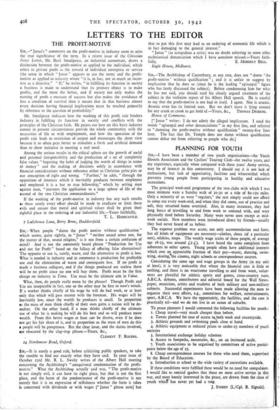THE PROFIT-MOTIVE
LETTERS TO THE EDITOR
SIR,—" Janus's " comments on the profit-motive in industry seem to miss the true significance of the term. In a rdcent issue of the Christian News Letter, Mr. Basil Smallpeice, an industrial accountant, draws a distinction between the profit-motive as applied to the individual, which refers to private profit as the reward of individual enterprise or service (the sense in which "Janus " appears to use the term) and the profit- motive as applied to industry where "it is, in fact, not so much an incen- tive as a directive." "If," he writes, "in fulfilling its function in society a business is made to understand that its primary object is to make profits, and the more the better, and if society not only makes the earning of profit a measure of success but also makes the avoidance of loss a condition of survival then it means that in that business almost every decision having financial implications must be reached primarily by reference to the question of profitability."
Mr. Smallpeice indicaLes how the working of this profit rule hinders industry in fulfilling its function in society and conflicts with the principles of the Christian faith. He points out how on this basis industry cannot in present circumstances provide the whole community with the necessities of life or with employment, and how the operation of the profit rule leads to restriction of output and encourages the short view because it so often pays better to stimulate a fresh and artificial demand than to show initiative in meeting a real need.
Among the serious results in the ethical sphere are the growth of social and personal irresponsibility and the production of a set of completely false values "begetting the habit of judging the worth of things in terms of money" and the making of decisions solely in accordance with financial considerations without reference either to Christian prineples or our conception of right and wrong. "Further," he adds, "through the opposition of interests which it inevitably produces between employers and employed it is a bar to true fellowship," which by setting man against man, "prevents the application to a large sphere of life of the second of the two Christian commandments."
If the working of the profit-motive in industry has any such results as these surely every effort should be made to eradicate or limit these evils and ensure that moral and spiritual values shall be given their rightful place in the ordering of our industrial life.—Yours faithfully,


























 Previous page
Previous page